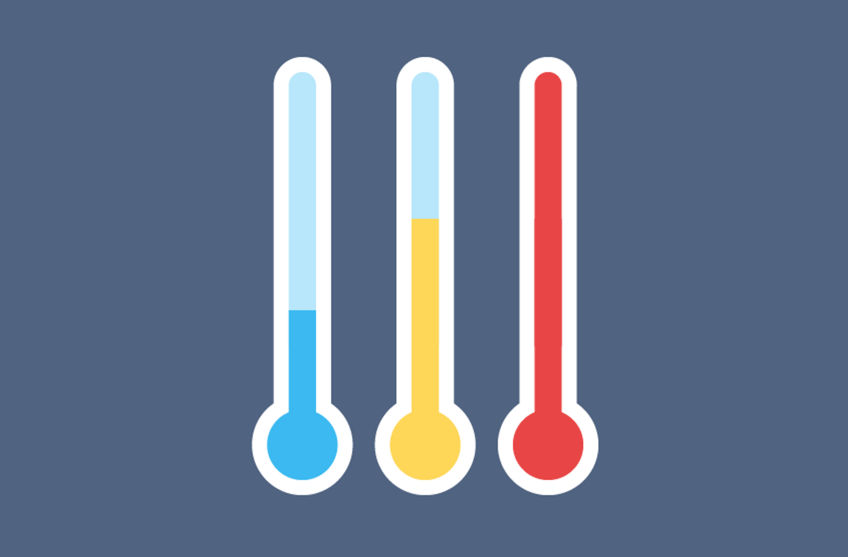
People with depression have higher body temperatures, suggesting there could be a mental health benefit to lowering the temperatures of those with the disorder, a new UC San Francisco-led study found.
The study, publishing today in Scientific Reports, doesn’t indicate whether depression raises body temperature or a higher temperature causes depression. It’s also unknown whether the higher body temperature observed in people with depression reflects decreased ability to self-cool, increased generation of heat from metabolic processes or a combination of both.
Researchers analyzed data from more than 20,000 international participants who wore a device that measures body temperature, and also self-reported their body temperatures and depression symptoms daily. The seven-month study began in early 2020 and included data from 106 countries.
The results showed that with each increasing level of depression symptom severity, participants had higher body temperatures. The body temperature data also showed a trend toward higher depression scores in people whose temperatures had less fluctuation throughout a 24-hour period, but this finding didn’t reach significance.

"What if we can track the body temperature of people with depression to time heat-based treatments well?”– Ashley Mason, PhD
The findings shed light on how a novel depression treatment method might work, said Ashley Mason, PhD, the study’s lead author and associate professor of psychiatry at UCSF Weill Institute for Neurosciences. A small body of existing, causal studies has found that using hot tubs or saunas can reduce depression, possibly by triggering the body to self-cool, for example, through sweating.
“Ironically, heating people up actually can lead to rebound body temperature lowering that lasts longer than simply cooling people down directly, as through an ice bath,” said Mason, who is also a clinical psychologist at the UCSF Osher Center for Integrative Health. “What if we can track the body temperature of people with depression to time heat-based treatments well?”
“To our knowledge, this is the largest study to date to examine the association between body temperature – assessed using both self-report methods and wearable sensors – and depressive symptoms in a geographically broad sample,” added Mason. “Given the climbing rates of depression in the United States, we’re excited by the possibilities of a new avenue for treatment.”
Co-authors: Ashley E. Mason, PhD, Wendy Hartogensis, PhD, Leena S. Pandya, PhD, and Frederick M. Hecht, MD, of UCSF; Patrick Kasl, Severine Soltani, Benjamin L. Smarr, and Abigail Green of UC San Diego; Stephan Dilchert of the City University of New York; Anoushka Chowdhary of the University of Arizona; Chelsea J. Siwik of Cleveland Clinic; Simmie L. Foster, Maren Nyer of Massachusetts General Hospital and Harvard Medical School; Christopher A. Lowry of University of Colorado Boulder; and Charles L. Raison of University of Wisconsin-Madison.
Funding: This effort was funded under MTEC solicitation MTEC-20-12-Diagnostics-023 and the USAMRDC under the Department of Defense (DOD). The #StartSmall foundation (#7029991) and Oura Health Oy (#134650) also provided funding for this work. The views and conclusions contained herein are those of the authors and should not be interpreted as necessarily representing the official policies or endorsements, either expressed or implied, of the U.S. Government.
Read the study
- Scientific Reports: Elevated body temperature is associated with depressive symptoms: results from the TemPredict Study
About UCSF Psychiatry and Behavioral Sciences
The UCSF Department of Psychiatry and Behavioral Sciences and the Langley Porter Psychiatric Institute are among the nation's foremost resources in the fields of child, adolescent, adult, and geriatric mental health. Together they constitute one of the largest departments in the UCSF School of Medicine and the UCSF Weill Institute for Neurosciences, with a mission focused on research (basic, translational, clinical), teaching, patient care, and public service.
UCSF Psychiatry and Behavioral Sciences conducts its clinical, educational, and research efforts at a variety of locations in Northern California, including the UCSF Nancy Friend Pritzker Psychiatry Building; UCSF Langley Porter Psychiatric Hospital; UCSF Medical Centers at Parnassus Heights, Mission Bay, and Mount Zion; UCSF Benioff Children’s Hospitals in San Francisco and Oakland; Zuckerberg San Francisco General Hospital and Trauma Center; the San Francisco VA Health Care System; UCSF Fresno; and numerous community-based sites around the San Francisco Bay Area.
About the UCSF Weill Institute for Neurosciences
The UCSF Weill Institute for Neurosciences, established by the extraordinary generosity of Joan and Sanford I. "Sandy" Weill, brings together world-class researchers with top-ranked physicians to solve some of the most complex challenges in the human brain.
The UCSF Weill Institute leverages UCSF’s unrivaled bench-to-bedside excellence in the neurosciences. It unites three UCSF departments—Psychiatry and Behavioral Sciences, Neurology, and Neurological Surgery—that are highly esteemed for both patient care and research, as well as the Neuroscience Graduate Program, a cross-disciplinary alliance of nearly 100 UCSF faculty members from 15 basic-science departments, as well as the UCSF Institute for Neurodegenerative Diseases, a multidisciplinary research center focused on finding effective treatments for Alzheimer’s disease, frontotemporal dementia, Parkinson’s disease, and other neurodegenerative disorders.
About UCSF
The University of California, San Francisco (UCSF) is exclusively focused on the health sciences and is dedicated to promoting health worldwide through advanced biomedical research, graduate-level education in the life sciences and health professions, and excellence in patient care. UCSF Health, which serves as UCSF’s primary academic medical center, includes top-ranked specialty hospitals and other clinical programs, and has affiliations throughout the Bay Area.





